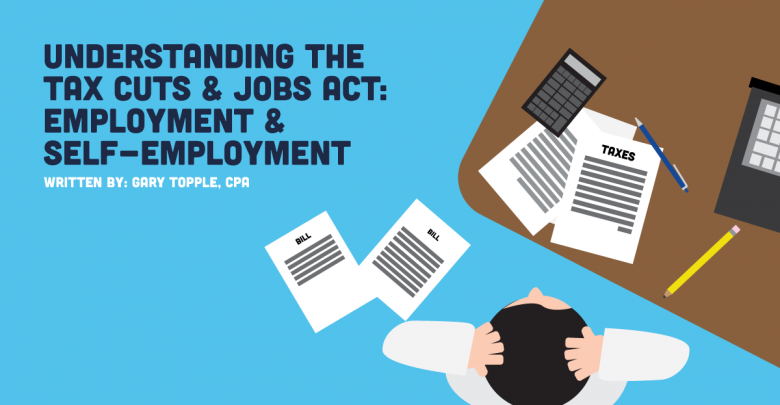On December 22, 2017 the Tax Cuts and Jobs Act (TCJA) was signed into law. You may be asking yourself how this act affects you. I will address two issues that may have a direct effect on your tax returns. The first if you are an employee and the second if you are self-employed.
The first thing I want to talk about is unreimbursed employee business expenses (Section 11045 of the TCJA). After that, I will discuss the pass-through business deduction, also known as Internal Revenue Code Section 199A (Section 11011 of the TCJA) for those of you who are self-employed.
Unreimbursed Employee Business Expenses
Unfortunately, for employees, I have some bad news. Before December 31st, 2017 miscellaneous itemized deductions were allowable deductions on your individual income tax returns. These included unreimbursed employee business expenses. These unreimbursed employee business expenses could have been things like work clothes, laundering your work clothes, supplies, travel expenses, and any other out-of-pocket business expenses paid by the employee and not reimbursed by the employer.
On your calendar year 2017 individual income tax returns, if you itemized your deductions and your unreimbursed employee business expenses exceeded 2% of your adjusted gross income, you could take a deduction for those expenses. For calendar years 2018 through 2025’s individual income tax returns, however, this deduction is “suspended” and you cannot deduct these expenses on your individual income tax returns.
If you were able to deduct your unreimbursed employee business expenses in the past you are probably asking yourself if this means that your tax liability will increase. The answer, like most answers when it comes to tax law, is maybe. The TCJA increased the standard deduction, and this may offset the loss of your deduction for unreimbursed employee business expenses.
The TCJA also reduced tax rates at various levels of income, so the loss of the deduction for unreimbursed employee business expenses may be offset by a lower tax rate. The way to determine the tax effect on your calendar year 2018 individual income tax return is to prepare a projection of income tax liability for calendar year 2018 based on similar income and deductions as those on the calendar year 2017’s individual income tax returns. If there has been a substantial change in income or deductions, that information should be factored into the projection for more accurate results. Maybe the bad news won’t be too bad after all.
Pass-through Business Deduction for Self-Employed Individuals
Effective January 1st, 2018, there is a pass-through business deduction that can constitute as much as 20% of qualified business income. Qualified business income is defined as the net income of any qualified trade or business of the taxpayer.
Now, before you start celebrating this new deduction, there are some limitations. If you are a partnership or an S-corporation the rules are more complicated than for sole proprietors. I will address only sole proprietors, including single-member LLCs at this time. If your business is a partnership or S corporation, feel free to contact me to discuss your situation.
As a healthcare professional, you are in a specified trade or business. Welcome to the club. As an accountant, I too am in a specified trade or business. This means that if your taxable income is greater than $157,500 ($315,000 if you are married filing joint tax returns), your pass-through business deduction will be the smaller of either 20% of your qualified business income or 20% of your taxable income on your individual income tax return.
As a healthcare professional, you are in a specified trade or business. Welcome to the club.
If your taxable income exceeds $207,500 ($415,000 if you are married filing joint tax returns) this deduction is not available. The pass-through deduction is a deduction used for the purposes of calculating your regular income tax and has no effect on the calculation of your self-employment tax.
You are probably asking yourself whether you qualify for this pass-through deduction, and if you do, how much of tax savings will be generated by the deduction. A projection of your calendar year 2018 income tax liability based on similar income and deductions as your calendar year 2017 individual income tax returns (if there has been no substantial change in income and deductions) should answer your questions. If there has been a substantial change in income or deductions, that information should be factored into the projection for more accurate results.
At the end of the day, if you have detailed questions about the process or calculations you’ll want to meet with your own CPA to determine the most accurate information.
At the end of the day, if you have detailed questions about the process or calculations you’ll want to meet with your own CPA to determine the most accurate information.
